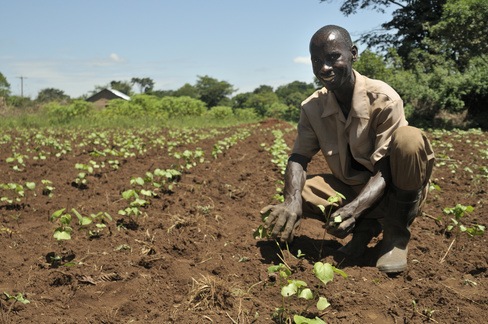The Agricultural Development Bank (adb) in 2014 invested about GH¢381 million into the agriculture sector, Mrs Sylvia Nyante, Head of Agricultural Finance at adb has announced.
She said the amount represented 400 per cent over the 2010 figure of GH¢72 million investments.
The massive jump was recorded despite high default rates due to weather related challenges as most crop production was undertaken under rain fed conditions.
Mrs Nyante, who was making a presentation at the National Farmers Day forum held in Bolgatanga in the Upper East Region, gave the breakdown as; Fishing and Acquaculture – GH¢125, 366,156.58; Industrial Crops – GH¢60,085,629.42; Food Crops – GH¢38,622,702.53; Livestock and Poultry – GH¢22,067,819.73; Agro Marketing – GH¢3,919,300; and Agro Processing – GH¢130,860,900.26.
This brings total investments in the agricultural sector in the past five years to GH¢500 million, the highest investment by a bank over a period of five years.
The Agricultural Development Bank won the best agricultural financing bank at the recent Ghana Banking Awards. It sponsored the farmers’ forum as part of the National Farmer’s Day celebrations.
The Head of Agricultural Finance of the Bank indicated that the agro processing sector had witnessed significant increase in investment with the best performing sector being fishing and aquaculture.
According to her, adb was working hard to ensure that the Ghanaian farmer got the best financing packages for their activities.
“As a bank we are determined to ensure that we provide all the necessary financial resources to our farmers to engage in profitable ventures in the sector, so as to be able to feed our nation and also export some outside.
“We have many packages our farmers and fishers can enjoy from, once they fulfill the basic requirements to access a loan facility of their choice,” she said.
Mrs Nyante, who also acted as Fund Managers for several projects, said adb offers massive support to develop the agro-processing sector to serve as a useful linkage for the primary production sector.
“The Agricultural Development Bank even in the face of stiff competition is determined to maintain its position as the best Agricultural financing bank in the country,” she added.
According to Mrs. Nyante, certain challenges such as the underdevelopment of the export market to meet export standards, inadequate agricultural infrastructure such as irrigation, processing and storage facilities, and the importation of cheaper agricultural produce were still militating against the bank.
Touching on the impact of adb’s investment in the sector, she said the bank had invested in the provision of raw materials for agro-processing companies, the development of the poultry industry from a subsistence level to a commercial state, as well as the importation of fishing inputs for artisanal fishing.
The Minister of Food and Agriculture, Mr Fiifi Kwetey in a brief remark, called on the youth to see Agricultural sector as a worthy venture to explore.
According to him, the population growth of the country is expected to rise to over 50 million in the next 10 years, and if steps are not taken to make the sector attractive, the country could face severe food shortage.





